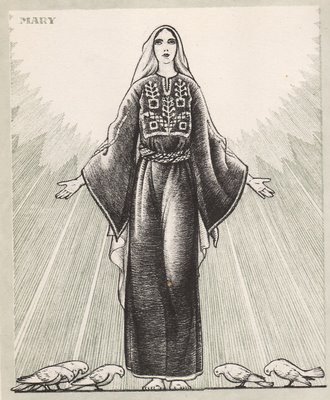
Madonna and Child with a Scroll --Luca della Robbia (c. 1455)
And Mary said: "My soul proclaims the greatness of the Lord;
my spirit rejoices in God my savior.
For he has looked upon his handmaid's lowliness;
behold, from now on will all ages call me blessed.
The Mighty One has done great things for me, and holy is his name.
His mercy is from age to age to those who fear him.
He has shown might with his arm, dispersed the arrogant of mind and heart.
He has thrown down the rulers from their thrones but lifted up the lowly.
The hungry he has filled with good things; the rich he has sent away empty.
He has helped Israel his servant, remembering his mercy,
according to his promise to our fathers, to Abraham and to his descendants forever."
-- Luke 1 : 46 – 55
The dogmas of the Assumption and the Immaculate Conception are often touchy subjects when it comes to ecumenical dialogue. The scriptural evidence is scant. In the popular American imagination, it sometimes goes like this - Envision phlegmatic, sclerotic, old Italian men in the curial bureaucracy flitting around in the dusty papal apartments in their slippers, scheming up ways to keep Catholics in line and keep them from jumping ship. A Marian idea pops into the Pope’s head and he declares a dogma just because he thinks he can, and he knows the superstitious peasants will listen to him. When all else seems to be failing, up the Marian ante...
There may have been an element of that (phlegmatic old men they may have been), but it’s not really the way it happened. Energetic and vibrant young theologians had been debating these points for centuries, but it was the laity that was really responsible, because in each case the laity knew it was true, they prayed for it to be recognized, they asked for it, and they prevailed upon the heirarchy to declare it so. A similar thing happened during the Arian controversy. The laity had a better grasp on the truth than the episcopate did.
“I think I am right in saying that the tradition of the Apostles, committed to the whole Church in its various constituents and functions per modum unius, manifests itself variously at various times: sometimes by the mouth of the episcopacy, sometimes by the doctors, sometimes by the people, sometimes by liturgies, rites, ceremonies, and customs, by events, disputes, movements, and all those other phenomena which are comprised under the name of history. It follows that none of those channels of tradition may be treated with disrespect: granting at the same time fully, that the gift of discerning, discriminating, defining, promulgating, and enforcing any portion of that tradition resides solely in the Ecclesia docens.
In that time of immense confusion (the Arian controversy) the divine dogma of our Lord's divinity was proclaimed, enforced, maintained, and (humanly speaking) preserved, far more by the Ecclesia docta than by the Ecclesia docens, that the body of the episcopate was unfaithful to its commission, while the body of the laity was faithful to its baptism..."
-- Cardinal John Henry Newman

Plate from The Christ Child
-- Maud and Miska Petersham
Doubleday and Company, Inc. 1931
December 8th - Feast of the Immaculate Conception
No comments:
Post a Comment